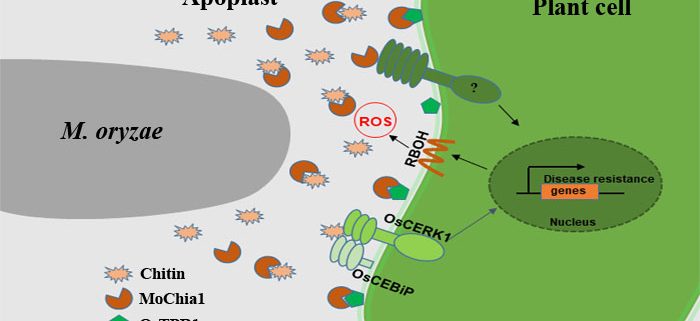The Battlefield in the Rice Apoplast
Yang et al. show how rice recognizes a Magnaporthe oryzae chitinase to trigger immune responses to this fungal pathogen. Plant Cell https://doi.org/10.1105/tpc.18.00382
By Chao Yang and Jun Liu
Background: Plants, like us, have an immune system that protects them from the majority of pathogen infections. Plants employ specific proteins (receptors) that recognize the conserved features of pathogens, such as the cell wall components or pathogen-secreted proteins. Once plants recognize the pathogens, the immune system is switched on. The immune system is particularly important for crops, as it is directly related to our food security. Rice is one of the worldwide growing crops, but they are often threatened by the fungal pathogen Magnaporthe oryzae. How this pathogen interferes with the rice immune system is not well understood.
Question: We wanted to know if there are any M. oryzae-secreted proteins that influence rice plant immune system.
Findings: We found a protein, named MoChia1, that can activate the rice immune response. MoChia1 exists in the plant apoplast and binds chitin, a polysaccharide that can activate many plant immune systems. M. oryzae cell walls contain chitin. Thus, rice plants recognize chitin and as a result, switch on their immunity against this pathogen. Unexpectedly, MoChia1 shelters chitin from chitin-activated immunity. As a result, rice immunity is suppressed. Rice plants, on the other hand, use a protein, OsTPR1, to free chitin from MoChia1. Then, the chitin-activated immunity is regained. We found that the rice immune system could be switched on by both M. oryzae-secreted chitinase and the cell wall component chitin. Our findings indicate that pathogens may be sneaky, but plants know how to fight.
Next steps: Increasing rice immunity will enhance their ability to defend themselves against pathogen infection and reduce yield loss. To understand how MoChia1 activates the rice immune response during M. oryzae infection, we will identify the MoChia1 receptor in rice. If we know how MoChia1 is recognized in rice, we could perhaps tailor rice plants to have increased disease resistance.
Chao Yang, Yongqi Yu, Junkai Huang, Fanwei Meng, Jinhuan Pang, Qiqi Zhao, Aziz Islam, Ning Xu, Yun Tian, Jun Liu. (2019).Binding of the Magnaporthe oryzae chitinase MoChia1 by a rice tetratricopeptide repeat protein allows free chitin to trigger immune responses. Plant Cell https://doi.org/10.1105/tpc.18.00382.
Tags: rice, biotic stress, plant immunity, chitinases, Magnaporthe oryzae.




